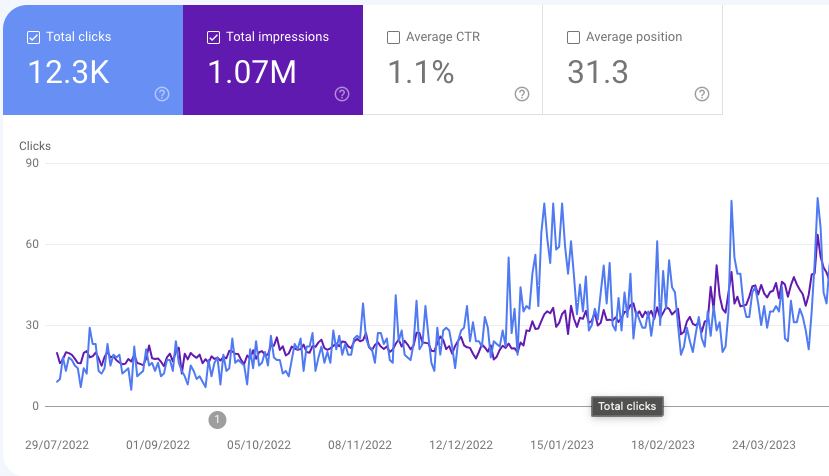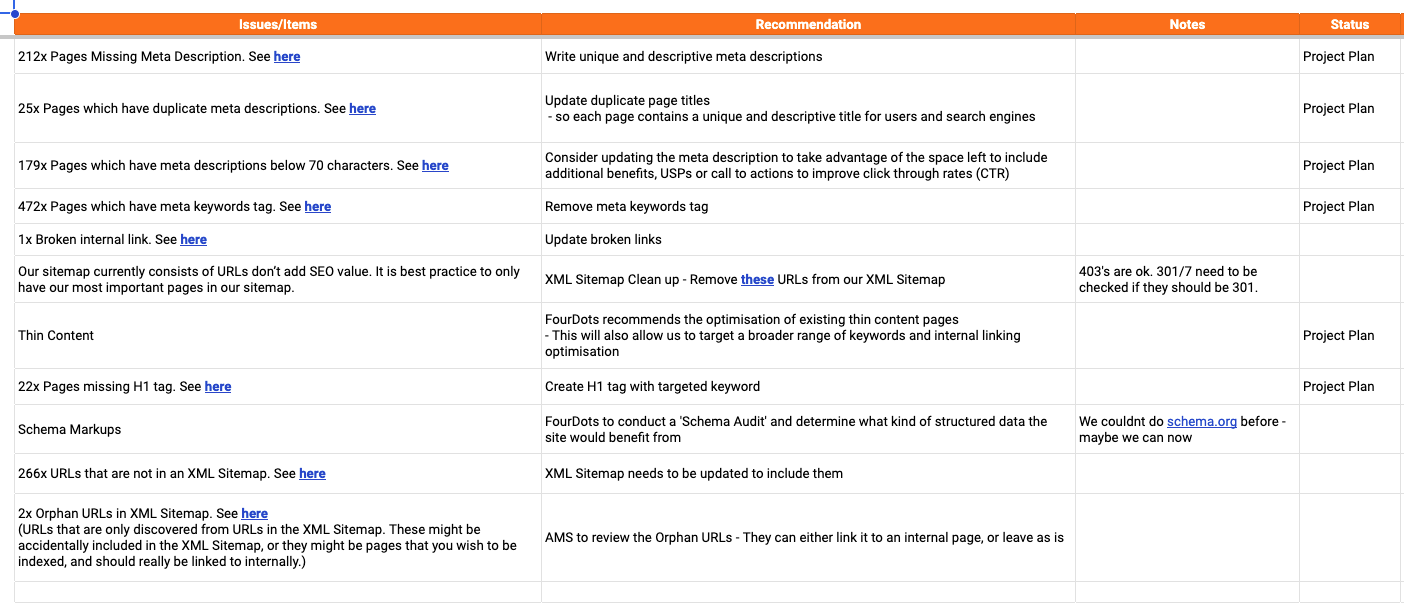Technical SEO Audit Services
Fix Technical SEO issues which are holding back your website from performing
If your website is not bringing the expected results even with advanced content strategies, chances are some of its technical properties are impeding your progress. Since only a properly built website is a well-performing website, you need to make sure that every single element is optimised to meet Google’s long-established criteria. This is where Four Dots Australia jumps in – as your reliable Sydney SEO partner. If you think your site is being held back by a technical SEO issue - reach out to us today.

How Technical SEO Audits Work
Working with our team of SEO specialists we can provide road maps and in-depth technical audits on how to prioritise and fix technical SEO issues which may be holding your site back. Our SEO Consultants are well versed in all major CMS’s including, Shopify, Magento, WordPress, Duda, Webflow, Squarespace and Wix. We have developed best practice guidelines for each of these CMS’s which can be deployed carefully and quickly to unleash your site’s SEO potential.
Fixing post migration issues increased this sites traffic by 150% instantly
 Our expert team of SEO specialists can repair website migrations and revive sites which have had website issues post changing CMS, Domain or theme’s. We have trained specialists in technical SEO challenges which come from updates across the web.
Our expert team of SEO specialists can repair website migrations and revive sites which have had website issues post changing CMS, Domain or theme’s. We have trained specialists in technical SEO challenges which come from updates across the web.

The team at Four Dots Australia have been a huge help in getting our App off the ground and being more visible online and generating customers!
Saul Edwards / Good Reviews
Why perform SEO Audits?
SEO has three main pillars which need to be optimised to put your website in the best position to rank for keywords. Technical optimisation is a key pillar that can often unlock the website and allow pages and keywords to rank higher and bring in more organic traffic. This is simply because search engines prefer to see web pages with clean code, well-organised page elements and optimised content. If any of these features are missing, your pages may be shown lower in search for keywords with exceptionally high competition. Web crawlers prefer to crawl sites which reduces their time, costs and resources. Providing websites that adhere to their guide lines puts your site in a better position than others.
Technical SEO Audits uncover issues you thought you had resolved.

We Fix Issues
Confused by Schema.org, CWV, 404s, 301s, Canonicals - let our team get rid of those errors you've found and help your site avoid errors in the future
Improve Website Speed
Do you have a slow website and your clients are bouncing? Speak to our team about improving website speed to increase conversions!
Get in contact
Contact us now and we'll start working right away on taking your online presence to a whole new level!
Get quoteHow is technical SEO different to other forms of SEO?
As opposed to other, user-oriented strategies, a technical SEO audit is a process that focuses on fixing technical issues which may be holding the website back from performing at its best. Coupled with content that offers real value for visitors, technical SEO is a key to being loved by Google, Bing, Yandex et al. If you have any doubts in relation to this or are unsure how a previous agency you collaborated with handled your website, Sydney SEO firm Four Dots Australia promises in-depth, objective analysis of the existing website, as well as specific suggestions for improvements.
The main pillars of technical SEO Audits are:
Website structure: Technical SEO focuses on optimising a website’s structure and hierarchy to make it easy for search engines to crawl and index the site’s pages. This can include things like using a clear and logical navigation menu, using header tags (H1, H2, etc.) appropriately, and creating a sitemap. On the other hand, other forms of SEO focus on making sure that the website’s pages are optimised for specific keywords and phrases, and that they are written in a way that is engaging and informative for users.
Page speed: Technical SEO also involves optimising a website’s page load speed, as search engines take into account the speed at which pages load when ranking them. This can include things like compressing images, minimising code, and using a Content Delivery Network (CDN). Other forms of SEO, such as content optimisation and link building, do not focus on page speed.
Accessibility: Technical SEO includes making sure that a website’s pages are accessible to both users and search engines by improving its accessibility. This includes things like making sure that the website is mobile-friendly, using alt tags to describe images, and providing transcripts for videos. Other forms of SEO focus on creating high-quality content and building links to a website to improve its visibility and ranking.
Crawling and indexing: Technical SEO also involves ensuring that all important pages of a website are properly crawled and indexed by search engines. This can include things like creating a robots.txt file to block certain pages from being crawled, and using canonical tags to avoid duplicate content issues. Other forms of SEO focus on creating high-quality content and building links to a website to improve its visibility and ranking.
It is important to note that while technical SEO and other forms of SEO are distinct, they are also closely related and often overlap. For example, a technically optimised website with fast page loading speed will be a better user experience which would improve overall SEO. Similarly, optimised content with relevant keywords and phrases will improve the website’s visibility and ranking, but it won’t be effective if the website has technical issues that prevent it from being properly indexed and crawled by search engines.
Technical analysis
Code efficiency
Page load time
Indexing issues
Crawl rank
International Optimisation
Website fixes
404 errors
Improper canonicalisation
301 redirects
Schema.org
Internal Linking
Search friendliness review
Image Optimisation
Mobile optimisation
Video Optimisation
Competitive analysis
E-E-A-T Reviews
Technical SEO FAQs
A technical SEO audit is a comprehensive review of a website's technical elements to identify any issues that could be negatively impacting its search engine rankings and organic traffic. A technical SEO audit is typically conducted by an experienced SEO professional or agency and involves a thorough analysis of a website's backend elements, such as:
Site architecture: This includes analyzing the website's URL structure, navigation, internal linking, and sitemap to ensure they are optimized for search engines and user experience.
Website speed: This involves analyzing the website's load times and identifying any technical issues that could be causing slow loading times.
Mobile-friendliness: This involves analyzing the website's responsiveness and mobile-friendliness, ensuring it is optimized for mobile devices.
On-page optimization: This includes analyzing the website's title tags, meta descriptions, headings, and content to ensure they are optimized for the targeted keywords and phrases.
Technical errors: This includes identifying any technical errors, such as broken links, duplicate content, or crawl errors, that could be negatively impacting the website's search engine rankings.
By conducting a technical SEO audit, website owners and SEO professionals can identify any technical issues that may be negatively impacting a website's search engine rankings and organic traffic. This information can then be used to make strategic optimizations and improvements to the website's technical elements, improving its overall search engine visibility and organic traffic.
The time it takes to conduct a technical SEO audit varies depending on the size and complexity of the website being audited, as well as the scope of the audit. A technical SEO audit can take anywhere from a few days to several weeks to complete, depending on the following factors:
Website size: The larger the website, the longer it will take to conduct a thorough audit.
Technical complexity: Websites with more complex technical elements, such as e-commerce sites, may require more time to analyze and audit.
Scope of audit: The more comprehensive the audit, the longer it will take to complete. A comprehensive audit may involve analyzing multiple technical elements, including site architecture, website speed, mobile-friendliness, on-page optimization, and technical errors.
Available resources: The amount of resources available to conduct the audit, such as the number of auditors and the tools used, can impact the time it takes to complete the audit.
In general, a thorough technical SEO audit can take anywhere from a few days to several weeks to complete.
At Four Dots Australia we aim to complete an audit within 3 weeks so we can provide you and your teams with enough information to implement the recommendations within the month. If required and if you use an authorised CMS we can implement the techncial recommendations as well.
CMS’s that we are authorised to implement on are:
Wordpress
Shopify
Squarespace
Wix
Bigcommerce
Magento
Joomla
Duda
Webflow
The frequency of technical SEO audits depends on various factors, such as the size and complexity of the website, the frequency of changes to the website, and the level of SEO competition in the industry. However, as a general rule of thumb, it is recommended to conduct a technical SEO audit at least once a year, or whenever there are significant changes to the website or search engine algorithms.
Here are some scenarios that may warrant a technical SEO audit:
Major website changes: If a website undergoes a major redesign, migration, or restructuring, it is important to conduct a technical SEO audit to ensure that all technical elements are properly optimized and functioning as intended.
Algorithm updates: Search engines regularly update their algorithms, which can impact a website's search engine rankings. When significant updates occur, it is important to conduct a technical SEO audit to ensure that the website remains optimized for search engine visibility.
Competitor analysis: If a website's competitors are making significant gains in search engine rankings, it may be time to conduct a technical SEO audit to identify any areas where the website can improve its technical optimization.
Performance issues: If a website is experiencing performance issues, such as slow loading times or crawl errors, a technical SEO audit can help identify the root cause of these issues and provide recommendations for improvement.
For our SEO Retainer clients we conduct an Technical Audit every 6 months and complete the tasks of highest priority first that will provide the most benefit.
Technical SEO can help improve website speed and performance in several ways, including:
Reducing page load times: Technical SEO can help identify and fix issues that can cause slow page load times, such as large image sizes, excessive code, or inefficient caching.
Optimizing website structure: Technical SEO can help optimize a website's structure to ensure it is easy to navigate and load quickly. This includes optimizing the website's sitemap, navigation, and internal linking structure.
Minimizing server response times: Technical SEO can help optimize a website's server response times by reducing the number of requests required to load a page and ensuring that the server is configured for optimal performance.
Implementing caching: Technical SEO can help implement caching to speed up website load times by storing frequently accessed data in a cache and delivering it more quickly to users.
Improving mobile-friendliness: Technical SEO can help improve a website's mobile-friendliness, which can have a significant impact on website speed and performance on mobile devices.
Proudly provide services to



















Latest from the blog
Advanced Technical SEO Tactics for 2025
As the digital landscape continues to evolve, staying ahead in SEO requires more than just basic optimisation techniques. Technical SEO is important as it impacts organic traffic, search result appearance, user experience, and overall SEO performance. Advanced technical SEO tactics are essential for ensuring your website remains competitive and ranks well in search engine results. […]
Read moreShopify SEO – How to Optimize Your Shopify Site for Google
Having a Shopify store is great, but if people can’t find it on Google, you’re missing out on potential sales. SEO (Search Engine Optimisation) is key to driving organic traffic to your Shopify store. With the right strategies, you can boost your rankings, attract more customers, and grow your business. In this guide, we’ll take […]
Read moreBoost Your Conversions Transform Your Landing Pages In Just 14 Days
In today’s digital world, your landing page is often the first thing people see when they visit your site. If it’s not up to scratch, you could be losing potential customers before they even get to know your business. But don’t worry – with the right tweaks, you can turn your landing page into a […]
Read moreSydney office
Level 26, 44 Market Street,
NSW 2000
Sydney,
Australia
Phone +61 289993731




